What is better crown or implant
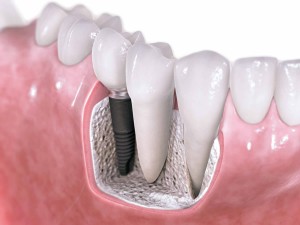
With the development of civilization, the problems of lack of teeth become more significant.
And this is due to the fact that the most important functions of the teeth are chewing and aesthetic.
A modern person strives to be beautiful, and the lack of a tooth for him can become a real problem.
He is ready to spend much more money on his appearance than on his own health.
A missing tooth, like any other organ, can be prosthetized, thus it is possible to restore its functionality.
For this, dentists can offer several options for solving this problem, for example: a crown or an implant can be installed.
What is an implant?
An implant is an artificial tooth root made of high-quality materials (most often titanium), implanted in bone tissue in place of a lost tooth.
In the future, after the engraftment of the titanium root, a denture made of various materials is put on it.
Fixation of the crown on the implant is carried out using cement.
Over time, the crown may wear out or become loose and it will be advisable to remove the crown, than to restore it.
Benefits:
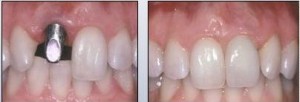
- Implants not only repeat the shape of the tooth, but also stimulate the processes in which live teeth take part. They are a complete replacement for real teeth.
- Reliability.
- Durability. In 90% of cases, implants serve throughout life.
- No need to grind your teeth.
- Implants do not impose restrictions on the nutrition of certain types of products.
Minuses:
- High price.
- The duration of the procedure.
- The presence of the postoperative period.
- Possibility of tearing the structure.
- The presence of contraindications.
- For a long period, you must visit the dentist.
When can I put
Implants can be installed in the following cases:
- If the patient does not want to have a bulky design in the mouth.
- If the patient refuses to grind adjacent live teeth.
- If it is impossible to install a bridge.
The number of implants can be set as many as missing teeth.
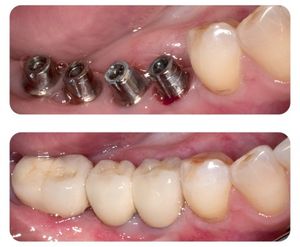
- They are most often prosthetically repaired with separately standing crowns; less often, bridge-like prosthetics based on implants is performed.
- Bridges using an implant and your tooth do not do at all.
- The reason is that each tooth is fixed in the socket using ligaments that allow it some mobility.
- The implant is firmly and motionlessly implanted into the bone tissue.
- For the correct distribution of the load on the implants, each is prosthetized with a separate crown.
Complications
May occur during implantation, in the postoperative period and later.
These include:
- Perforation of the maxillary sinus with a lack of bone tissue.
- Damage to the mandibular nerve.
- Bleeding in the presence of poor blood coagulation.
- Pain in the early postoperative period.
- Divergence of seams.
- Inflammation and infection of the wound surface, which can lead to peri-implantitis and implant rejection.
- The placement of implants that impedes further prosthetics is associated with the incorrect position of the implant in the bone.
Video: “What is dental implantation”
What is a crown?
The crown is the outer shell of the tooth, which is fixed on damaged or abutment teeth.
The crown is made of various materials.
Prior to the fixation of a permanent crown, a temporary denture may be installed on the patient.
Types of crowns
- Temporary crowns. They are made of plastic.
- Ceramic crowns. They can be made of zirconium or porcelain.
- Ceramic-metal dental crowns. They are made of metal, on top of which a ceramic mass is applied.
- Metal crowns. Most often they are made of gold.
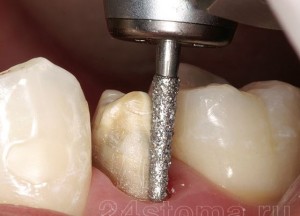
Photo: Grinding a tooth under a crown
Pros:
- Affordable price.
- Fast production and fixation.
Minuses:
- Grinding teeth under the crown is required.
- The cost of crowns is lower than implants.
Complications
- For some time after installation, there is a feeling of discomfort in the mouth.
- Food may fall under the bridge, due to the presence of a small flushing space between the bridge and the gum.
- Excessive blockage of food particles between the crown and the adjacent tooth may be due to a crown defect or the presence of a filling on the adjacent tooth.
- Exposure of the neck of the tooth occurs due to creeping gums.
The choice of prosthetics
The way to eliminate the defect depends on the state of the oral cavity as a whole, and also, in particular, on each individual tooth.
To determine the method of prosthetics, the state of bone tissue, the shape of the jaws and the general health of the patient are evaluated.
- If the patient decides to build a bridge, then the condition of the supporting teeth (the ability to leave them alive) and the quality of the filling of the canals are taken into account.
- If the patient selects implantation, a complete examination is necessary, which necessarily involves various specialists and, first of all, the surgeon and orthopedist.
- For a more accurate assessment of the condition of bone tissue, the location of the mandibular nerve, an orthopantomogram and computed tomography are performed.
Which is better
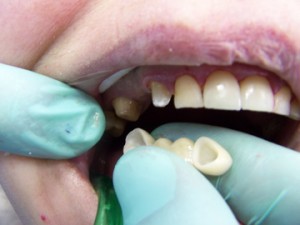
- When restoration of one or more missing teeth is required in a row, implantation may be the best option.
- If the teeth adjacent to the defect are alive and do not have fillings, then it is better to restore them with the help of implants, since after the teeth are removed, their service life will be significantly reduced.
- If the supporting teeth have defects or fillings, it is better to choose a bridge prosthetics.
| Implants | Crowns |
| Durability. In 90% of cases, implants serve throughout life. | The crown is mounted on a dead tooth. For this, the nerve is removed. Tooth loss is a matter of time. |
| No need to grind your teeth. | Turning and depulpation of teeth is required, which leads to their destruction in the future. |
| You can eat any products. | Taking solid food is contraindicated. |
| Crowns on implants are fixed to the abutment - the transition element, which gives the design a solidity. The fastening line is located under the gum, which creates a tightness and prevents food from getting under the crown | The presence of halitosis due to the ingestion of food under the crown, which is removed using an irrigator. |
| Even a dentist can hardly distinguish an implant from a real tooth. | The presence of a dark rim along the edge of the gum will give out the owner of the crown. |
Cost
- The cost of implantation depends on the region and the clinic that will carry out the implantation.
In Moscow clinics the cost of such a service will be from 10 to 20,000 rubles.
- The cost of the crown depends on the material from which it will be made.
| Dental crown | Prices |
| Temporary plastic crown | from 3000 to 6000 rubles |
| Zirconium implant crown | 25,000 rubles |
| Cermet crown | from 10,000 to 15,000 rubles |